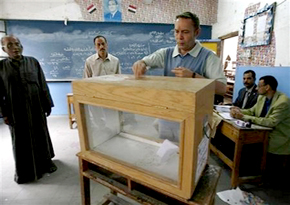 CAIRO: Two men sit at a Cairo café playing backgammon. Their conversation quickly turns to politics and this November’s Parliamentary vote. One of the men, 63, remarks that Egyptians are “politically conscious, but politically inactive.” His playing partner nods in silent agreement.
CAIRO: Two men sit at a Cairo café playing backgammon. Their conversation quickly turns to politics and this November’s Parliamentary vote. One of the men, 63, remarks that Egyptians are “politically conscious, but politically inactive.” His playing partner nods in silent agreement.
Egyptian Opposition Parties Call for Boycott of Parliamentary Election
By-Egypt News
Home News
00:10
Thursday ,07 October 2010

“What are we supposed to do if we all know what is to be done, but nobody is willing to take the risk? So the parties call for a boycott,” Abdelhamid tells The Media Line. He is referring to the boisterous calls from leading opposition parties and leaders, including Mohamed ElBaradei from the National Movement for Change and chairman of Al-Ghad party Ayman Nour.
Both leaders have called on Egyptians to avoid the polls during the Parliamentary elections, which, according to a well-informed source, will take place sometime in the last week of November. The government has yet to confirm a date.
The calls for boycott have been met with both support and criticism. Supporters of the boycott argue that there is no need to cast a ballot in Egyptian elections.
Former Al-Ghad party member Hamid Reda, for instance, has argued, “the government already knows who is going to win, so why should we participate in a sham.” Hamid said that “no matter what Egyptians do, and even if they were to go in and everyone voted against the NDP [the ruling National Democratic Party], nothing would change and we would be stuck with the same political system and people as we have always had.”
ElBaradei – Whom earlier this year returned to Egypt with much pomp and vigor – is seen by many as the potential political savior of Egyptian politics, but he too has called on his supporters to stay home for the vote.
He amplified the calls for an election boycott over Twitter.
“Total boycott of elections & signing petition R first steps 2 unmask sham ‘democracy.’ Participation wld be contrary to the national will,” wrote ElBaradei on September 1 to his over 10,000 followers.
Vast amounts of Egypt’s opposition agree with this stance on the elections.
“We have to remain strong and not succumb to something that will just give the government some kind of legitimacy, even if we know it is rigged,” said Ayman Nour in an email press statement.
Nonetheless, Nour’s Al-Ghad has said it will not stand in the way of party members running as independents in the election, which has left many wondering.
For Abdelhamid, he says his advertising background comes in handy in understanding the way the opposition sells this idea to the public without sounding contradictory.
“Most Egyptians understand why there is a boycott, but still the problem is the government, not the idea itself,” he began. “If they are going to sell this to the public, it has to be completely unified and justified. There can’t be people known to be a part of a political party or movement running as independents. Egyptians want solidarity, but too often we see that there is nothing to be done when one person or a few individuals go it alone and this is the problem.”
Abdelhamid argues that if the parties sitting in parliament were the only ones to contest the elections, it would lend the boycott less credibility within Egypt and with foreign governments.
On the other hand, the Muslim Brotherhood, an Islamic group whose members hold 88 seats in the current legislature, is against boycotting the electionsMuslim Brotherhood will field candidates in the upcoming elections, Parliamentary bloc leader Saad al-Katatni said in a statement on October 1. [Editor’s note: Although the party is ‘banned’, individuals associated with the party are permitted to run.]
The Brotherhood has fallen into controversy lately. The group won a surprising number of seats in the 2005 vote, but since then has been nearly silent on calls for change. Although the group has ostensibly shown support for opposition movements in the country, notably ElBaradei’s National Movement for Change, they have more to lose by participating in the election.
The banned group, in order to field a candidate in next year’s presidential election, must secure a large number of seats in Parliament. Only heads of political parties are currently allowed to run for president, but the People’s Assembly can approve a candidate. Therefore, the Brotherhood needs many votes.


